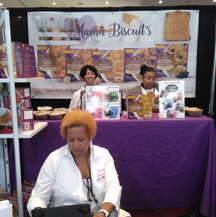
The company produces preserves from indigenous fruits, including morula, baobab, and wild berries. “The United States Agency for International Development Southern African Trade and Investment Hub (USAID) assisted us in participating in the fair,” says co-owner Olayemi Agang. USAID provided them technical marketing assistance including introducing them to the show. “They have given us a chance we otherwise would not have” he said. There are four USAID African Investment Hubs.
Other companies among the 16 in the Africa Fine Food Pavilion also used plants readily available in Africa as an ingredient in their products. South Africa’s Superinga uses moringa to make iced teas, teas, and energy drinks.
From nearby Zambia, ZaamRoot, exports moringa leaves. One of their customers, Oakland, California-based Kuli Kuli Foods, produces a Moringa Superfood Bar. At the ZaamRoot booth, they made me a moringa, mint, apple juice, and lime drink, which was the most refreshing one I had that whole day.
Oryx Desert Salt was another unique product from the homeland. It is from the massive Kalahari Desert in South Africa and made from salt water from an ancient underground lake.
Other Africans from home and abroad at the Javits Center exhibition included Yolélé. The company sells a West African grain called fonio in Senegal and findi in Gambia says co-founder Pierre Thiam, or Peter Cham, as he may have been named if he was Gambian. However, long before the French and the English split Senegambia into two countries, African people had celebrated the grain for centuries. “Fonio has been found entombed in Egyptian pyramids,” Thiam says.
Yolélé sells a West African grain called fonio in Senegal and findi in Gambia.
As I tasted his Zesty Rice and Red Beans, we talked about empanadas in Latin America and the Philippines being similar to Jamaican and West African meat pies. And, hibiscus drinks in Jamaica being called sorrel, but called bissup in Senegal and wonjo in Gambia. Other items they sale include Yuca (Cassava) Fries.
A Senegelese-based company, Zena Exotic Fruits, produces jams, jellies, marmalades, fruit butters, nectars, juices, syrup, and pepper sauce from locally produced fruits and vegetables including hibiscus, mango, peppers, and cashews. The company takes pride with being the first Senegelese company to export to the USA under the African Growth and Opportunities Act (AGOA). I often buy their products while in Senegal’s new Blaise Diagne International Airport.
Back in the USA and just north of DC, in Frederick, Maryland, Leslie Reily of Mama Biscuit’s whips up ready-to-bake comfort cobblers. Like most products, they too tout being all-natural, with no preservatives, trans fat, artificial flavors, colors, or dyes. New York-based Jennifer Ntiri, a first generation African-American of Ghanaian heritage, offers baked goods through her company OSo Good. Volta West African Foods, which sells Sheto, a traditional sauce, was also started by a North American of Ghanaian heritage.
In the next issue, POH will present several companies whose products caught my attention, not because of their connection to Africa or the African diaspora, but simply because of their uniqueness or they greatly peaked my interest.






